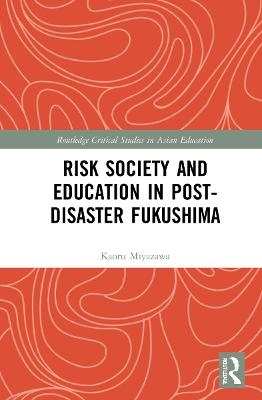
Risk Society and Education in Post-Disaster Fukushima
Seiten
2021
Routledge (Verlag)
978-0-367-54670-0 (ISBN)
Routledge (Verlag)
978-0-367-54670-0 (ISBN)
This book examines how the concept of a risk society was handled in education programs implemented in post-disaster Fukushima after the explosion of the Fukushima Daiichi power plant. A valuable resource for scholars and students in the fields of globalization and education, curriculum studies, sociology of education, and Japanese studies.
In response to the explosion of the Fukushima Daiichi power plant in March 2011, this book examines how the concept of a risk society was handled in the various education programs implemented in post-disaster Fukushima.
The explosion and subsequent radiation contamination that affected the biosphere of the Fukushima region and beyond, revealed that we live in a risk society. Despite this revelation, official discourses in Fukushima have been geared strictly toward the future, with the aim of restoring communities and resuming development projects. Based on the ethnographic data the author collected in Fukushima between 2013 and 2016, various contested emotions emerged in those education spaces as students and teachers remembered their romanticized and difficult past and dealt with the challenges presented by the risk society in their present lives. The emotionally-charged interactions between past and present also shaped their vision of their future community and of the actions they might take. The dialogues and actions that took places in these education spaces encourage readers to examine the meaning of development and question the basic assumptions and methods of education as society shifts to a risk society.
A valuable resource for scholars and students in the fields of globalization and education, curriculum studies, sociology of education, and Japanese studies.
In response to the explosion of the Fukushima Daiichi power plant in March 2011, this book examines how the concept of a risk society was handled in the various education programs implemented in post-disaster Fukushima.
The explosion and subsequent radiation contamination that affected the biosphere of the Fukushima region and beyond, revealed that we live in a risk society. Despite this revelation, official discourses in Fukushima have been geared strictly toward the future, with the aim of restoring communities and resuming development projects. Based on the ethnographic data the author collected in Fukushima between 2013 and 2016, various contested emotions emerged in those education spaces as students and teachers remembered their romanticized and difficult past and dealt with the challenges presented by the risk society in their present lives. The emotionally-charged interactions between past and present also shaped their vision of their future community and of the actions they might take. The dialogues and actions that took places in these education spaces encourage readers to examine the meaning of development and question the basic assumptions and methods of education as society shifts to a risk society.
A valuable resource for scholars and students in the fields of globalization and education, curriculum studies, sociology of education, and Japanese studies.
Kaoru Miyazawa is an Associate Professor and Chair in the Education Department at Gettysburg College, USA. She received an Ed.D. from the Department of Curriculum and Teaching at Teachers College, Columbia University in 2010, and was a visiting scholar at Fukushima University, Japan and the University of Wisconsin-Madison in 2015-2016.
1. Introduction 2. History of Modern Japan and Nuclear Energy 3. Becoming Insider and Outsider in Fukushima 4. Contested Defintions of Risk in Fukushima 5. Reconstruction and Creating Spaces for Healing 6. Discrimination Against Hibakusha and Developing Global Networks 7. The OECD Tohoku School 8. Love for Genpatsu and Forming New Relationships 9. Conclusion
| Erscheinungsdatum | 04.01.2022 |
|---|---|
| Reihe/Serie | Routledge Critical Studies in Asian Education |
| Zusatzinfo | 1 Tables, black and white; 2 Line drawings, black and white; 6 Halftones, black and white; 8 Illustrations, black and white |
| Verlagsort | London |
| Sprache | englisch |
| Maße | 156 x 234 mm |
| Gewicht | 453 g |
| Themenwelt | Naturwissenschaften ► Biologie ► Ökologie / Naturschutz |
| Sozialwissenschaften ► Pädagogik ► Allgemeines / Lexika | |
| Sozialwissenschaften ► Pädagogik ► Bildungstheorie | |
| ISBN-10 | 0-367-54670-1 / 0367546701 |
| ISBN-13 | 978-0-367-54670-0 / 9780367546700 |
| Zustand | Neuware |
| Haben Sie eine Frage zum Produkt? |
Mehr entdecken
aus dem Bereich
aus dem Bereich


